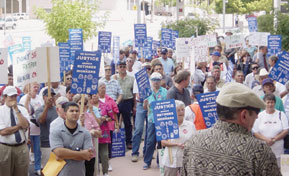|
January/February 2005 IBEW Journal

Asarco union retirees and supporters
gather at federal court house in
Tucson, Arizona, to protest against Grupo Mexicos attack
on health
care benefits. |
Youre sitting on your porch, enjoying another
day of retirement after a lifetime of work in Arizonas
copper mines and smelters. Youre not rich, but youll
survive on your union-negotiated pension and health care
benefits. Or so you thought.
Thats until a stranger shows up at your front door to serve
you with court papers. Youre not involved in any court case.
Whats the deal?
Youre being sued by your former employer, American Smelting
and Refining Company (Asarco Inc.), now a division of Grupo
Mexico SA, one of the worlds largest mining companies. Whats
the charge? You are still collecting medical benefits and
Grupo Mexico is sick of paying the bills.
This isnt a joke. This is the cold reality for a growing
number of retirees in America, including those of IBEW Locals
518 and 570 who spent decades maintaining Asarcos mines
and processing facilities in Hayden, Ray and Silver Bell,
Arizona.
A recent article in The Wall Street Journal described the
latest tactic by employers to escape the growing costs of
providing health coverage to union retirees. In mid-2003,
Asarco Inc. sent letters to retirees notifying them of an
increase in their health care premiums. "As it did so, " reports
the Journal, "the copper company sent summonses to some
retirees in Arizona, where many live, telling them they were
defendants in a suit it was filing."
The suit cites a paragraphinserted in the 1993 health planthat
says: "The company reserves the right to amend or terminate
the plans at any time for any reasoneven after you retire." Asarco,
like other employers, also contended that retiree benefits
are subject to "duration clauses," meaning that
they expire simultaneously with labor agreements.
Chuck Yarter, a retired steelworker, discussed the cuts
in health care and prescriptions in a Labor Day speech that
was re-printed in The Rumble, a newsletter from the Solidarity
Council for Justice, a group of eight unions, including the
IBEW. Before the cutbacks, Yarters yearly pension was $12,214.
Medical deductibles were $150, leaving him with $12,064 per
year.
After the cuts, Yarters deductibles rose to $2,500, leaving
him with only $6,450 for the year. He says: "We retired
Americans are now under attack by the very companies that
benefited from our working years."
Unions representing workers at Asarco are fighting back.
The Solidarity Council for Justice held a rally of hundreds
of copper retirees and supporters at the Federal Courthouse
in Tucson in September. Council members have also met with
union leaders from Asarco/Grupo unions in Mexico and Peru
to discuss common problems.
The IBEW, the United Steelworkers of America and the International
Chemical Workers have filed a counterclaim to enforce contractual
obligations for lifetime retiree medical benefits.
Rejecting the mining giants allegation of "severe
financial distress," the unions point to exorbitant
salaries lavished on upper management.
Mike Verbout, assistant business manager of Tucson IBEW
Local 570 says that Grupo Mexicos downsizing has compounded
retirees problems, forcing them to "run around to get
answers to medical benefit questions."
There wont be any answers coming from the federal government.
A U.S. Department of Labor spokesman said that pensioners "arent
our constituents anymore."
Grupo Mexicos combative stance on retiree health care mirrors
their relationship with the active work force. The contract
between Grupo Mexico and IBEW, USWA and other unions has
expired. After years of failing to maintain their own plants
and equipment, Verbout says, "now they want concessions,
under the implied threat that they wont invest in future
operations."
The copper region of Arizona has a history of vicious labor-management
conflict from a 1917 strike and another pivotal strike at
Phelps Dodge in 1983. The company hired replacement workers
and eventually decertified locals of the United Steelworkers
of America, a move that has been cited as a turning point
in U.S. labor relations.

|
